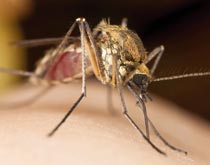During a summer internship at the Santa Fe institute, Amy Wesolowski found herself working with Nathan Eagle, a postdoc researching cell phone data to track trends of human travel in Kenya.

“The possibility of using cell phone data to look at behavior questions interested me,” she says, so she made that project her senior thesis. The collaboration didn’t stop there. Eagle’s wife, Caroline Buckee, is an evolutionary biologist specializing in infectious disease. She thought it would be interesting to see whether cell phone data could quantify the impact of human travel on malaria.
“I’d been working on the travel data—the statistical side of it—and she was studying the epidemiology of malaria, so it just fell together in a nice way,” recalls Wesolowski.
Last fall, Wesolowski—a third-year doctoral candidate in CMU’s Department of Engineering and Public Policy—was the lead author of a paper published in the prestigious journal Science that tracked the cellphone use of 15 million Kenyans, mapping their travel patterns then correlating the findings with malaria prevalence data.
“For a given region, this can help provide an estimate of the parasite’s origin,” she says. “Once you know that, you can target localized intervention strategies, such as indoor spraying or distribution of bed nets, to prevent its spread.”
The stakes are high: of 41 million Kenyans, 25 million are at risk for contracting malaria; tens of thousands die from it every year.
This fall, Wesolowski will join colleagues in Kenya who are partnering with local health agencies to help eradicate this scourge. She plans to spend six to nine months there as part of her work toward her PhD.
—Cary Groner (A’80)
Related Links:
Carnegie Mellon's Amy Wesolowski Tracks Spread of Malaria in Africa Through Cellphone Records



